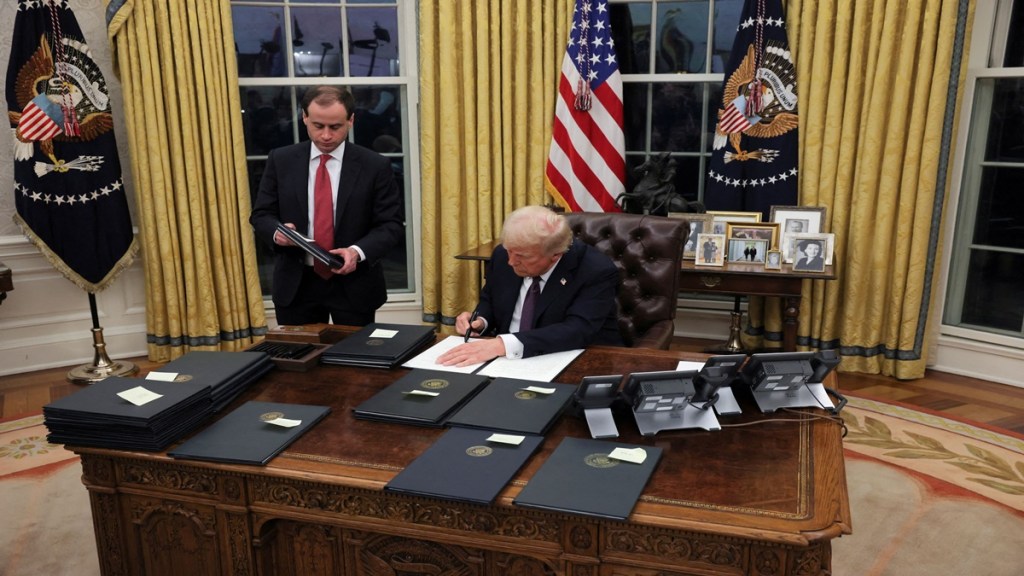Donald Trump has been elected as the 47th president of the United States. On Monday, Trump issued a flurry of executive orders and directives and one of them included his decision to terminating the country’s membership from the World Health Organization (WHO).
In an executive order issued hours after he took the oath of office, Trump cited a string of reasons for the withdrawal, including the global health agency’s “mishandling of the COVID-19 pandemic,” and the “failure to adopt urgently needed reforms.” He said the agency demands “unfairly onerous payments” from the United States, and complained that China pays less.
According to a report by The Guardian, the decision with withdraw means the US will leave the United Nations health agency in 12 months’ time and stop all financial contributions to its work. It is noteworthy that the US is the biggest financial contributor, contributing around 18 percent of its overall funding. WHO’s most recent two-year budget, for 2024-2025, was $6.8billion. The next-largest donors to the WHO are the Bill & Melinda Gates Foundation, although most of that funding goes to polio eradication, and the global vaccine group Gavi, followed by the European Commission and the World Bank. The next-largest national donor is Germany, which contributes around 3% of the WHO’s funding.
“World Health ripped us off, everybody rips off the United States. It’s not going to happen anymore,” Trump said at the signing.
The announcement has already sparked widespread criticism from health experts around the world. Terming the decision as “a regressive move for global health”,former and the first chief scientist at the WHO, Dr Soumya Swaminathan told Financial Express.com: “…with this, the US will only end up losing more than it can gain. Not only will it not be able to influence or impart inputs on crucial health issues but by opting to opt out of the WHO network, not be able to get critical data, that may help prepare better for any future pandemic. Therefore, it is neither good for the US nor for the rest of the world.”
Trump’s decision to withdraw the UN health body is not unexpected. In 2020, during his first term, Trump had also taken steps to quit the body while accusing the WHO of aiding China’s efforts to “mislead the world” about the origins of Covid-19. Before the U.S. withdrawal could be completed last time, Joe Biden won the country’s presidential election and put a halt to it on his first day in office on January 20, 2021.
The global healthy agency has continued to deny the allegations and maintains it still presses China to share data to determine whether Covid-19 emerged from human contact with infected animals or due to research into similar viruses in a domestic laboratory.
According to a report by news agency Reuters, the US exit will likely put at risk programmes across the organisation, according to several experts both inside and outside the WHO, notably those tackling tuberculosis, the world’s biggest infectious disease killer, as well as HIV/AIDS and other health emergencies.
Trump’s order also said the administration would cease negotiations on the WHO pandemic treaty while the withdrawal is in progress. U.S. government personnel working with the WHO will be recalled and reassigned, and the government will look for partners to take over necessary WHO activities, according to the order. The order also said that the government will review, rescind, and replace the 2024 U.S. Global Health Security Strategy as soon as practicable.
WHO responds
On Tuesday, the WHO said that it regrets the announcement that the US intends to withdraw from the Organisation.
“WHO plays a crucial role in protecting the health and security of the world’s people, including Americans, by addressing the root causes of disease, building stronger health systems, and detecting, preventing and responding to health emergencies, including disease outbreaks, often in dangerous places where others cannot go, the UN health body said in a statement.
The United States was a founding member of WHO in 1948 and has participated in shaping and governing WHO’s work ever since, alongside 193 other Member States, including through its active participation in the World Health Assembly and Executive Board, it added.
“For over seven decades, WHO and the USA have saved countless lives and protected Americans and all people from health threats. Together, we ended smallpox, and together we have brought polio to the brink of eradication. American institutions have contributed to and benefited from membership in WHO,” the UN health body stated.
With the participation of the United States and other Member States, WHO has over the past 7 years implemented the largest set of reforms in its history, to transform our accountability, cost-effectiveness, and impact in countries, it added.
“This work continues. We hope the United States will reconsider and we look forward to engaging in constructive dialogue to maintain the partnership between the USA and WHO, for the benefit of the health and well-being of millions of people around the globe,” WHO stated.
(The story and headline have been updated after receiving a statement from WHO)


